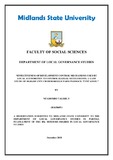Please use this identifier to cite or link to this item:
https://cris.library.msu.ac.zw//handle/11408/3704| Title: | Effectiveness of development control mechanisms used by local authorities to control illegal settlements: a case study of Harare city Crowborough Farm Paddock 27 invasion | Authors: | Nyadombo, Valery V. | Keywords: | Local authorities Development control mechanisms |
Issue Date: | 2018 | Publisher: | Midlands State University | Abstract: | The main aim of the study is to examine the effectiveness of development control mechanisms employed by local authorities in controlling illegal settlements. The specific objectives include: to examine various development control mechanisms used by the City of Harare to control and stop illegal land invasions and settlements, to analyse the influences of development control towards sustainable cities, to assess the extent of community participation in the implementation of development control mechanisms and to find possible solutions to the prevailing challenges encountered in the implementation of development control mechanisms. The literature review is primarily based on e-resources and journals in an effect to gain more insight, identifying the gaps of what makes development control and its various mechanisms important to sustainable cities and challenges surrounding its mediocre results, empirical evidence available to compare the implementation and the effectiveness of development control mechanisms in countries such as Uganda and the United Kingdom and issues of community participation and awareness of the development control issues basing on the critical analysis was also covered. The modernist planning theory was explored as a theoretical base for this study. The researcher adopted a descriptive research design to get a better understanding on issues to do with effectiveness of development control mechanisms employed by local authorities to control illegal settlements. The study was undertaken in the City of Harare Crowborough farm paddock 27 and the population size constituted of 513 respondents and a sample of 113 was drawn. The study gathered data through the use of questionnaires, interviews and secondary data. Out of the 100 questionnaires 64 were retrieved this was impressive as it exceeded the minimum levels and also considering the diversity of the settlers. The study established that more than 70% had heard of development control within the study area, however when they were asked further on what it really was many of them pointed out that it was demolitions, and this shows that there is partial knowledge of what development control is all about. The study found out that incapacitation in human, financial resources, technical expertise and logistics equipment had grossly affected the City of Harare to fully enforce its development controls. Corruption, politics, rapid urban population growth, poverty and weak borrowed controls were found out to be the leading factors behind the dilemma in the rise of illegal settlers. In line with the findings the various recommendations are proposed to ensure the effectiveness of development control activities on illegal land invasions and settlements. Development control is an intricate activity as it is largely influenced by the environments in which its mechanisms are applied therefore it requires a holistic approach and the provision of all necessary resources for its success. | URI: | http://hdl.handle.net/11408/3704 |
| Appears in Collections: | Bsc Local Governance Studies Honours Degree |
Files in This Item:
| File | Description | Size | Format | |
|---|---|---|---|---|
| Final Final Final VALE.pdf | Full Text | 2.32 MB | Adobe PDF |  View/Open |
Page view(s)
312
checked on Feb 14, 2026
Download(s)
240
checked on Feb 14, 2026
Google ScholarTM
Check
Items in MSUIR are protected by copyright, with all rights reserved, unless otherwise indicated.



